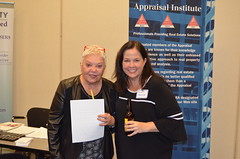Category Archives: ICAP at AARO
ICAP Attended The 2016 AARO Spring Conference
On behalf of ICAP, Ken Mrozek, MAI, SRA attended the Appraiser Qualifications Board (AQB) Public Meeting and Association of Regulatory Officials (AARO) 2016 Spring Conference. This year’s spring conference was held April 8-10 at the Hyatt Regency Downtown in Phoenix, Arizona. It was attended by representatives from the TAF, ASC, AQB, APB, ASB, ,OCC, several AMCs, AI, ASFMRA, NAIFA, State Coalitions (including Illinois, Ohio, Arizona) as well as many state regulator departments.

Topics of discussion at the conference included:
- Updates from TAF, ASC, AQB, APB and ASB
- Definitions and Differences Between Appraisals and Evaluations
- Background Checks – Update
- Safety Tips for Those Dealing with Complaints
- ASC Oversight and AMC Final Rules
- Customary and Reasonable Fee Survey
- AMC Appraiser Panel – The Inside Story of Appraiser Selection and More
- Alternative Valuation Standards
- AMC Legislation Discussion
Additionally, time was allocated to various Break Out Sessions, meetings included: AMCs & Professional Organizations, Board Members, Investigators, Administrators and Attorneys, and Industry Representatives. The following is a summary of the discussions as presented by the various presenters and discussion panels.
Appraiser Qualifications Board (AQB) Public Meeting

Joseph C. Traynor, Chair of Appraisal Qualifications Board (AQB), AQB Public Meeting
The AQB held a public meeting prior to the start of the AARO Conference from 9:00 am to 12:00 pm (agenda). Reports were given from the various The Appraisal Foundation (TAF) boards, including TAF, ASB, APB, and ASC. The reports were shorter versions of the reports and discussions given during the AARO Conferences. And so, most information covered in this meeting is addressed later in this report. Information covered in the AQB Public Meeting which was not covered in AARO Conference Notes, includes:
- Agenda (click here)
- National Exam Statistics (Pass Rates)
- AQB stated exam pas rates have remained stable since 2008 and are satisfied with the pass rates
- Discussion on Shortage of Appraisers centered on article (click here) by David Bunton in Appraisal Buzz
- There was a period of time allowed for public comment.
Association of Appraiser Regulatory Officials (AARO) Conference
Suzy Gardner, Certified Fraud Examiner, FDIC spoke on Appraisals and Evaluations
- Presentation (click here)Appraisals – FDIC Expectations
- Written
- USPA Compliant
- Contains sufficient information
- Analyze Deductions and Discounts for Construction Projects
- Contains an estimate of market value
- Evaluations – FDIC Expectations
- Does not need to be USPAP Compliant
- Must provide a credible value conclusion
- Individual preparing evaluation must be competent
- Possess RE training/experience
- Independent of transaction
- Provide support for determination of market value
- An Evaluation per Agencies’ Guidelines provides an estimate of market value
- FDIC does not prevent an Real Estate Appraiser from completing an Evaluation
- An appraiser completing an Evaluation
- It is an appraisal
- It must comply with USPAP
- An appraiser completing an Evaluation
- FDIC only requires an appraisal for a small percentage of transactions (Federally Regulated Transactions – FRT)
- Reported that in 1994 only 4% of all Real Estate Transaction required the services of a RE Appraiser (over $250,000).
- Today only 12% of all Real Estate Transaction require the services of a RE Appraiser (over $250,000)
- If the threshold is raised to $400,000, then only 6% would require a RE Appraiser
- If the threshold is raised to $500,000, then only 4% would require a RE Appraiser
- Noted the amount of transactions which have appraisals complete is significantly higher than what is required
David Bunton, President of The Appraisal Foundation (TAF) gave an overview on TAF Activities
- Presentation (click here)
- Appraiser Regulator Town Halls
- On-line Courses for State Regulators
- 4-Hour Online USPAP Course for state regulators is now available
- Investigator Training (Levels I, II, & III): St. Louis, MO
- Legislative Activity on Standards
- 25th Anniversary, Appraiser Regulatory System
Jim Park, Executive Director of the Appraisal Subcommittee (ASC)
- Presentation (click here)
- ASC Oversight of State Appraisal & AMC Programs
- Certification and Licensing of Appraisers
- Registration and Supervision of AMC’s
- 55 States & Territories Rated (10 Excellent, 31 Good, and 14 Needs Improvement)
- ASC Monitoring & Review of Appraisal Foundation
- What is an FRT? – Title XI FIRREA defines
- ASC Maintains National Registries (Appraiser/AMC)
- 97,500 credentials
- 39,400 Certified General
- 50,000 Certified Residential
- 8,300 Licensed
- Trainees
- 9,000 to 10,000 (not tracked by ASC, estimated)
- 97,500 credentials
- Unique Identification Number (for each appraiser)
- Developed application and interface
- Currently in State Testing
- Roughly 6 – 12 months voluntary adoption period
- Initiate rulemaking if needed in 2017
- Number would only be used between state and ASC
Rick Baumgardener, Chair of Appraisal Practices Board (APB)
- 6 Valuation Advisories Adopted
- 5 Valuation Advisories Under Development
- Collection and Verification of Residential Sales Data Used in the Sales Comparison Approach
- Collection and Verification of Data Used in the Sales Comparison Approach for Non-Residential Properties
- Valuation of Green & High Performance Property – 1 to 4 Unit Residential
- Valuation of Green& High Performance Property – Commercial, Multifamily and Institutional
- Valuation for Financial Reporting (VFR)
- Investigating Potential Future Advisories
- Discounted Cash Flow Analysis (DCF)
- Retrospective Value Opinions
- Prospective Value Opinions
Joe Traynor, Chair of Appraiser Qualifications Board (AQB)
- Discussion Draft – Potential Areas of change in the Real Property Appraiser Qualification Criteria Areas of discussion include:
- Alternative Track for Licensed Residential to Certified Residential
- Enhanced Practicum Curriculum
- Documenting Alternative Experience
- “Trainee” Nomenclature
- Three-Year Supervisory Residency Requirement
- USPAP Q&A Updates
- 1st Exposure Draft for 2018/2019 USPAP Expected to be out in April
- Proposal to “Draft” Report concerns
- Looking for feedback
- Won’t be tied to completion of assignment
- Will be tied to signed certification
- Drafts must be clearly and conspicuously identified
- If trying to send work results in draft, could be an ethics violation
- Record keeping – record of all reports must be in work file
- Proposal to “Draft” Report concerns
- Clarifying Term “Assignment”
- Valuation service the appraiser provides
- Turnaround time is a contractual agreement, not a USPAP violation
- Assignment guidelines like Fannie Mae Guidelines violations are USPAP violations
- Assignment conditions that apply to scope of work are subject to USPAP compliance
- 1st Exposure Draft for 2018/2019 USPAP Expected to be out in April
Background Checks Panel
- Debra Rudd, Division Manager, Real Estate Appraisal Division
- Arizona started Background Checks in 2007
- Trouble understanding criminal terminology & equivalencies of “Rap Sheet”
- Board wasn’t able to look at Rap Sheet, but had to approve or deny
- Training of staff & board members difficult
- Regular turnover
- Confidentiality was troublesome
- 1-2 people could open envelope
- Kept in separate locked cabinet
- Tried “clearance card”
- FBI database not always updated
- Some appraisers already approved of offense, but flagged on Rap Sheet
- Arizona started Background Checks in 2007
- Kristen Worman, General Counsel, Texas Appraiser Licensing & Certification Board (TALCB)
- TALCB Slide Set (click here)
- Criminal History Checks in Texes (since 2007)
- TALCB Working Group – Appointed in 2015
- Recommendations & Lessons Learned
- Fingerprint Background Checks on all existing and applicants
- Fingerprints required only on the first background check
- Tim Doyle, Senior VP, Conference of State Bank Supervisors discussed the NMLS System, slide set (click here). It is available to State Regulators as a method to track their Appraiser licensees. It tracks pertinent data, including licenses, education, and discipline. It is also compliant with 2017 background check requirement. Their systems are an approved channel for the FBI national database, required for proper background checks. Submitted background checks are received back in 2 to 12 hours.
Review of AMC Rule, Jim Park, Executive Director of ASC & Alice Ritter, ASC General Counsel
- What is an AMC?
- Within a given year, oversees a network or panel of
- More than 15 certified or licensed appraisers in a state, or
- 25 or more nationally
- Recruit, select, and retain appraisers;
- Contract with licensed or certified appraisers to perform appraisals;
- Manage the process of having an appraisal performed, including providing administrative duties; or
- Review and verify the work of appraisers.
- Within a given year, oversees a network or panel of
- Participating State Authority
- Register and renew AMC registrations
- Examine AMCs and require AMCs to submit relevant information to State
- Verify appraisers on AMC appraiser panels hold valid State certifications or licenses
- Conduct investigations of AMCs to assess for potential violations
- Discipline AMCs
- Report violations to ASC
- AMC Ownership Limitations
- AMC Registration Fee to be Collected by States for ASC
- $25 multiplied by the number of appraisers working for or contracting with that AMC in such State during the previous year
- AMC’s not in existence for a years, $25 multiplied by the number of appraisers working for or contracting with that AMC in such State since the AMC commenced doing business
- AMC Final Rules 1st Draft should be out for 60-day comment period in April
Customary & Reasonable Fee Survey
- Larry Disney, Executive Director of Kentucky Real Estate Appraisers Board
- Kentucky conducted 1st survey in 2013, getting ready to update in 2016
- SE Louisiana University completed survey
- Considered by Report Type (1004, 1004 FHC, 1004C, 1025, 1073, & 2055)
- Bruce Unangst, Executive Director of the Louisiana Real Estate Appraisers Board
- Louisiana uses C&R Study as a tool to avoid problems
- Kept the study simple, made it available to all stakeholders, updated annually
- Louisiana did have an adjudication hearing for one AMC
- Unanimous vote (including AMC Rep on the board) against AMC
- $10,000 fine + around $13,000 costs of adjudication hearing
- Currently up for appeal
- Herb Holloway, Research Economist at Southeastern Louisiana University Business Research Center
- 5 States have conducted studies (TX/LA/KY/VA/GA)
- SE University fees for survey have run between $8,000 and $15,000
- Survey all online and by email
- Note: there has been no evidence to date for any correlation between years of experience and fees
- Can be difficult interpreting C&R Fee Study
Alternative Valuation Standards
- Scott Robinson, 2016 President of the Appraisal Institute
- Presentation (click here)
- Standards of Valuation Practice & Valuer’s Code of Professional Ethics
- Adopted in 2014
- Proposing as an “Additional” set of Standards for AI Members and Valuation Professionals
- May be used where national/international standards are not required
- Standards are:
- An Additional set of standards
- Principles-based
- Focus on the core principle rather than on compliance with rules
- Standards are not:
- Not intended to supplant USPAP or other national standards
- Not an alternative to USPA or IVS or other relevant standards
- Not rules-based
- Not dictate methodology

- David Bunton, President of The Appraisal Foundation
- Presentation (click here)
- Recognizing standards other than USPAP for non-federally regulated transactions would seriously erode public trust
- Legislative Initiatives for Alternative Standards to USPAP – Texas, California, Montana, Tennessee, Florida, Virginia
- Alternative Standards to USPAP Divisive, Expensive, and Opposed
- Significant Impact
ICAP Participates NSAO Meeting, Washington, D.C.
October 16, 2015:
by Karen Emerle, SRA
ICAP is one of 21 State appraiser coalitions currently participating in the Network of State Appraiser Organizations (NSAO). On October 16, 2015, NSAO held a Work Group meeting at the National Association of Realtors (NAR) offices in Washington, D.C. NAR graciously provided use of their conference room for NSAO’s day-long meeting.
ICAP Director, Karen Emerle, SRA, attended the afternoon segment. She was one of 15 members, representing 13 State appraisal coalitions, present at NSAO’s Washington, D.C. Work Group meeting. Current issues affecting appraisers, legislation and/or litigation updates relevant to the individual States were shared by participants. The Work Group will continue to pursue issues germane to all State coalition members.
NSAO’s focus is on improving the appraisal industry and protecting the consumer. In an effort to further those goals, participants agreed future meetings should be bi-annual and scheduled to coincide with AARO’s Spring and Fall conference dates and locations.
Mortgage Bankers Association (MBA) representatives William Kooper, MPA, Tamara I. King, and Matt Jones attended the afternoon meeting. William Kooper, MPA, is the Associate Vice-President of State Government Affairs & Industry Relations. Tamara I. King is the Associate Vice-President of Loan Production and Member Engagement, Residential Policy. Matt Jones is the Regulatory Assistant, Residential Policy and Member Engagement.
The dialogue focused on topics of concern and interest to NSAO members. Recent FHA/HUD compliance issues raised the question, “What is the responsibility of the appraiser versus the lender’s responsibility?” Various vendor management practices which affect or could affect appraiser independence, the latent time delay utilized when ordering appraisals, Fannie Mae and CU issues, and the change needed which would allow appraiser trainees to sign reports were discussed.
MBA noted under the new Rule, effective August 10, 2015, AMCs are required to report every appraiser on their panel. How does the AMC National Registry database get built? What fields should be built into it? In those States that already have AMC regulations, what is working, and what is not working? The link to the Federal Register, Vol. 80. No. 110, Minimum Requirements for Appraisal Management Companies; Final Rule is: http://www.gpo.gov/fdsys/pkg/FR-2015-06-09/pdf/2015-12719.pdf.
MBA was receptive to finding areas in which a consensus might be reached and/or areas where working together would be beneficial to all parties involved. ICAP will keep its members updated as things develop.
Spring 2014 AARO Conference
On behalf of ICAP, Ken Mrozek, MAI, SRA attended the Association of Regulatory Officials (AARO) 2014 Spring Conference, where discussions included state compliance reviews, national registry, USPAP, Dodd Frank Act, AMC Regulation, mandatory background checks, and more. This year’s spring conference held April 11-13 at the Sir Francis Drake Hotel in San Francisco, California. It was attended by representatives from the TAF, ASC, AQB, APB, ASB, AMCs, Members of the Conference of State Bank Supervisors, AI, IAAO, NAA, IAC, FBI, as well as many state regulator departments (including Brian Weaver ad Mark Thompson from Illinois). Topics of discussion at the conference included:
- Updates from TAF, ASC, AQB, APB and ASB
- Criminal History Reports & Background Checks;
- Reducing Complaint Processing Times: Successful Complaint Reductions Plans & ASC Review Findings
- Mortgage Fraud Investigation
- Supervisor/Trainee Course Development & Maintenance
- Federal Legislation on Background Checks and the February AQB Exposure Draft
- Appraiser and AMC Regulatory Issues and Updates
Additionally, time was allocated to various Advisory Council Meetings, meetings included: ASC Advisory, Qualifications Advisory, USPAP Advisory, AMC Advisory Council, and Appraiser Professional Organizations Advisory Council. The following is a summary of the discussions as presented by the various presenters.
Jim Park, Executive Director of the Appraisal Subcommittee (ASC)
- New State Rating System for State Compliance
The old ASC State Rating system had three ratings: In Substantial Compliance, Not In Substantial Compliance, Not In Compliance. The new rating system, as of June 1, 2013, states have 5 ratings. Eighteen states have been rated so far in 2014 (including Illinois). The rating categories and number of states rated are:
o Excellent (2-year review cycle)/4 States
o Good (2-year review cycle)/8 States
o Needs Improvement (2-year review cycle)/6 States
o Not Satisfactory (1-year review cycle)/ 0 States
o Poor (Continuous Monitoring)/0 States
Illinois was reviewed September 2013 and was rated: Needs Improvement with a 2-Year review cycle with follow-up.
- National Appraiser Registry
There was discussion on how states are keeping the National Appraiser Registry up to date with licensee information. At present, 27% of states are entering all data directly into the National Registry. California is using SOAP System, which is linked to the National Registry and automatically updates the registry daily.
- Appraiser Population
Mr. Park discussed the appraiser population, which peaked in 2008 with approximately 120K appraisers. It had declined at a 3% to 5% annual rate through 2012. He noted that the rate of decline decreased in 2013 to 1%, where we are currently at approximately 100K appraisers. These numbers to not include trainees.
- Dodd Frank Act – Appraisal Complaint National Hotline, Statistics
Since implementation as required by the Dodd Frank Act, the Appraisal Complaint Hotline website has had approximately 6,200 website hits. The call center has taken 287 calls and there were 289 federal referrals and 865 agency referrals.
- AMC Regulation
The AMC Regulation Requirements were released for 60-day Comment Period. The Comment Period ends June 9th. There may be another round of requirement and another 60-day comment period. Once the new requirements are enacted, states will have 36 months to comply (with one possible 12 month extension). The AMC Registration also includes a definition of an AMC, which differs from the current Illinois definition.
- Federal Regulations to Come and ASC 2014 Priorities
Mr. Park discussed additional regulations and other Appraisal Subcommittee priorities that may be seen in the future. These include:
o Interagency guidelines require all valuations to be subject to review. The Appraisal Standards Board is just starting to look at Automated Valuation Modules (AVM’s) and how the board might ensure Quality Control.
o The ASB is looking to develop a Unique Appraiser ID Number that will be tied to the National Appraiser Registry. The number would be used at the state and federal level to identify and track individual appraisers.
o The Dodd Frank Act requires the ASB to develop an AMC National Registry. This is still in progress.
David Bunton, President of The Appraisal Foundation (TAF)
- Investigator Training
TAF developed courses for Investigator training. There were two levels of investigator available and one newly announced training. There are currently 310 Level I Trainers and 204 Level II Trainers. TAF will not be offering a Level III investigator training course which will focus on evaluating appraisal report writing and reporting investigator findings.
- Foundation to Publish a “Digest of USPAP Court Cases”
TAF will publish a collection of court cases across the country which cites USPAP. The volume of court cases citing USPAP has grown exponentially, according to Mr. Bunton. A website subscription will be available in time. There was not timeframe given to when it would be published or when the website would be available.
The foundation has an electronic library available with resources to assist appraisers. Resources highlighted include:
o Training Videos
o AQB Updates
o APB – Its Role and Function
o Understanding the Appraiser Regulatory System
o Introduction to Green Buildings
o Mock Administrative Hearing
o Roundtable – Business Valuation Profession as it Relates to Financial Reporting
Mr. Bunton described a new non-profit organization established with the support of thirteen appraisal-related organizations, known as Alliance for Valuation Education. The alliance’s primary goal is to develop valuation education that broadens and complements those courses currently being offered in the marketplace. The Alliance will not be a provider of education. The education developed by the alliance will be made available for wholesale purchase by education providers and professional organizations who will serve as course presenters. Initial focus of the Alliances is on Continuing Education and may consider development of Basic Qualifying Education Courses or Remedial Courses later.
Wayne Miller, Chair of Appraiser Qualifications Board (AQB)
- Background Checks Mandate
Mr. Miller announced that earlier that day, the Board voted to postpone mandate for background checks to 1/1/2017. States can still implement prior to this date, but after 1/1/2017, states will be required to complete background checks on all new appraiser applicants.
- Personal Property Appraiser Criteria
Mr. Miller stated that the Personal Property Appraiser Criteria have not been updated since 1998. The AQB is working on updating these criteria and there will likely be an Exposure Draft released soon
- Jobs Analysis Survey sent out to appraisers recently
A recent job s analysis survey was sent over 23,000 emails throughout the country. A total of 14.6% completed the entire survey and the board expressed gratitude for all those completing the survey. The results will drive how appraisers are tested in state exams. The initial results from the survey indicate that since 2008, state appraiser exams have been testing the “right” things. The AQB is looking to see how exams could be shortened without losing effectiveness. Mr. Miller also published the success rates for State Exams, nationwide. In 2013, 1st Time Test Taker Pass Rates for Certified Residential was 69% and for Certified General was 54%.
- Other AQB Discussion points
o 466 of 509 USPAP Instructors renewed their instructor’s license this year. There were 24 new instructors.
o The AQB is considering a University Degree Program, where university students would take college courses that would count for college credit as well as Qualifying Education towards their appraiser license.
Barry Shea, Chair of Appraisal Standards Board (ASB)
- The ASB is the largest it has been, currently at 8 members. Members include: 5 Certified Generals, 2 Certified Residential, and 1 Personal Property
- The Second Exposure Draft for 2016-2017 USPAP is out for comment, some changes:
o Definition of “Report”
- Communication of Assignment Results/Drafts
- Standard 3
- Retrospective versus Prospective Value Opinions
- Reasonable Exposure Time
- Statement 9
- Confidentiality & Ethics Rule. This rule as written as a few unintended consequences. As written, an appraiser is unable to show the appraisal report under investigation to their own attorney due. Additionally, the board is considering two confidentially concerns. One, how does the rule apply to clients that are no longer in existence, such as bankrupt banks. Also, how the rule applies to staff members of an appraisal company.
- Courses being worked on by the ASB
o Appraisal Review Courses
o A course providing a more in-depth look at the applications of USPAP (beyond the 7- and 15-hour courses). This would be an optional course which would look at USPAP as it applies to extraordinary circumstances.
Rick Baumgardener, Chair of Appraisal Practices Board (APB)
- Subject Matter Expert (SME) Process
o Mr. Baumgardener discussed the Subject Matter Expert (SME) Process. There is currently a SME pool of approximately 100 experts in various topics. Once a project has been identified, SME’s will define the Scope of Work for the project and the AQB will approve before the project moves forward. This is not meant to be a “How To” guide, but only provide the basic information for appraisers. The current SME project is the Valuation of Green Buildings. There is a Second Exposure Draft – Valuation of Green Buildings: Background & Core Competency out for comment. Future projects will divide Valuation of Green Buildings into Residential and Non-Residential buildings. The APB is now considering new projects, including:
- Collection and Verification of Sales Comparable Data
- Green Buildings Residential
- Green Buildings Non-Residential
- Tangible and Non-Tangible Assets
- Valuation of Financial Reporting
Criminal History Reports and Background Checks – Defensible Decisions
- Anne Petit, Superintendent of the Ohio State Division of Real Estate & Professional Licensing discussed Defensible Decisions in Administrative Regulation. Ohio has been completing Background Checks on appraiser applicants for some time. She covered the ethical and legal concerns related to implementation. Denials are appealable, but the applicant must appeal to the state board.
- Alec Stone, Legal Counsel for California Bureau of Real Estate Appraisers stated that California statute now requires all new applicants to pass a background check. It is not yet clear if upgrades are required to pass a background check. Mr. Stone stated that 15% to 30% of initial applicants have a “rap” sheet, and over half of these are related to DUI’s. Less than 5% of offences are related to drug felonies or sexual misconduct, and less than 1% is related to fraud.
NMLS System (National Multiple Licensing Services)
- Tim Doyle, Senior VP, Conference of State Bank Supervisors discussed the NMLS System. It is available to State Regulators as a method to track their Appraiser licensees. It tracks pertinent data, including licenses, education, and discipline. It is also compliant with 2017 background check requirement. The systems are an approved channel for the FBI national database, required for proper background checks. Submitted background checks are received back in 2 to 12 hours.
Panel Discussion: Reducing Compliant Processing Times: Successful Complaint Reductions Plans and ASC Review Findings
- Panel:
o Mark Mrnak, Enforcement Director, Texas
o Danitra Kourkounakis, Enforcement Chief, Ohio
o Elizabeth Seaters, Enforcement Chief, California.
- Brian Weaver, Illinois Appraisal Coordinator asked Mark Mrnak on the panel about “Contingent Dismissals” used in Texas. Mr. Mrnak stated that Contingent Dismissals are successfully used in Texas to avoid formal disciplinary. This is available for 1st time offenders with minor or major deficiencies or 2nd time offenders with minor deficiencies. The offender must agree to the terms of the conditional dismissal. Terms may include courses, mentorship, or written assignments. It is usually a short timeframe for completing terms (~6 months). If offender meets required actions, the offense is dismissed with a warning letter which stays in the record, but it is not reported to ASC or AMC’s. A future offense would still be considered a 1st time offense. There are consequences if the terms are not met. The mentorship program includes board approved mentors and the offenders must pay for the mentor’s time. The offender is able to select their own mentor.
- Scott DiBiasio, Appraisal Institute’s Manager of State and Industry Affairs asked panel how states might enforce compliance if appraiser was not required to comply with USPAP, only the USPAP Ethics and Competency Section, for Non-FRT (Federally Regulated Transactions) work. Panel was unsure how to respond, and stated that states require appraisers to be compliant with USPAP. Scott alluded to potential future changes that may require appraisers of Non-FRT appraisals to only comply with the Ethics and Competency Section of USPAP.
Panel Discussion: Supervisor/Trainee Course Development & Maintenance
- Panel:
o John Brenan, The Appraisal Foundation (TAF) – introduced the Supervisory Appraiser/Trainee Appraiser Education Q&A published by The Appraisal Foundation. Worth checking out if you’re a trainee or supervisor. Note: State may add to the requirements beyond the federal requirements.
o Craig Steinley, South Dakota – implementation of a Supervisory/Trainee Appraiser course in South Dakota. Mr. Steinley discussed the implementation of the education in South Dakota. There is a core content section where the AQB provides minimum content. A second portion is the jurisdictional topics related to supervisory and trainee topics specific to the state. AQB allows the states to decide whether the course is considered Continuing Education or not. AQB does not stipulate time requirements. Training has ranged for various states has ranged from around four hours to two days. Illinois course is not yet complete, but is likely going to be a one day 7-hour course for both sections, and likely to be available on the fall of 2014. More to follow.
Panel Discussion: Regulatory Issues: Federal Legislation on Background Checks & the February AQB Exposure Draft
- Panel:
o Tim Doyle (NMLS) – Further discussed NMLS as a possible method for meeting background check compliance through the NMLS system. Noted: NMLS is owned by the Office of Comptroller and is a Not-for-Profit which is owned and regulated by state regulators. Potential future additions to system include: Examination Suite, Risk, Electronic Surety Bonds
o John Brenan (TAF) – Discussed Exposure Draft – 2015 Real Property Appraiser Qualification Criteria as it relates to Background Checks
o Doug Oldmixon (Texas) – Texas considering Background Checks for AMC’s. Also considering statute that would prevent AMC’s from passing on cost to appraiser for excess requirements beyond state requirements.
Panel Discussion: Regulatory Issues: Appraiser and AMC Regulatory Issues and Updates
- Panel:
o Scott DiBiasio, Appraisal Institute – Federal Guidance.
- Mr. DiBiasio discussed risk management guidance. Regulated Institutions are responsible for actions of 3rd Part Entities, such as AMC’s. This has moved more institutions (banks) to bringing AMC functions back in-house. He stated that there are approximately 60% to 80% less residential appraisals ordered through AMC’s currently than in the past year.
- 38 States have passed Comprehensive AMC Oversight & Registration Law and 17 jurisdictions have yet implemented any law. There are many states now looking to update their AMC law. Several states are considering a Recovery Fund versus Surety Bond. Additionally, several states are finding Surety Bonds at $25,000 or less inadequate and increasing to $100,000.
- Some states have added a State Board Member for AMC’s and others have developed an AMC Advisory Board to advise the State Board
- Other Issues being discussed concerning AMC’s are what constitutes an AMC. Dodd Frank Act, which currently relates primarily to residential appraisals, and if/how it relates to commercial appraisals. There is also discussion on what distinctions (if any) should be made between companies with employees versus independent contractors.
- New Proposed Rules for AMC Act were released last week. Mr. DiBiasio offered a checklist he developed to help states analyze if they meet requirements (but stated it is only a working document, not a definitive guide).












